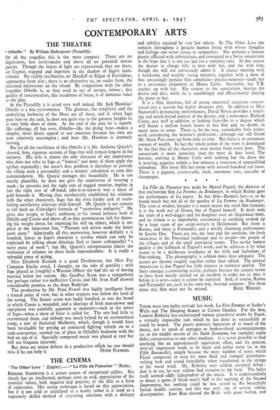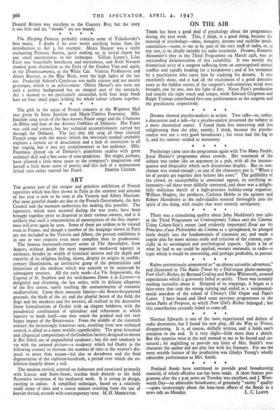MUSIC
THERE were two ballet revivals last week, La Fête Etrange at Sadler's Wells and The Sleeping Beauty at Covent Garden. For the first, Lennox Berkeley has orchestrated various pianoforte works by Faure, a virtually impossible task which he has done as successfully as could be hoped. The purely pianistic figuration of so much of the music, not to speak of arpeggio or broken-chord accompaniments (as in the middle section of the Sixth Nocturne, for example) really defies transposition to any other medium. it is never possible to find anything but an approximately equivalent effect, and the general, over-all impression tends to be fussy and rather noisy (as in the Fifth Barcarolle), simply because the mere number of notes which Faure compasses in even his most fluid and tranquil pianoforte- writing look and sound formidable when transferred to the strings or the wood wind. Mr. Berkeley very seldom accepted defeat : that is to say, he very seldom had recourse to the harp. The ballet itself seemed oddly independent of the music. It is understandable to dance a game of blind man's buff to the opening of the Second Impromptu, but nothing could be less suited to the beautifully lyrical middle section; and this was only one of several similar discrepancies. June Brae danced the Bride with great feeling, and
Donald Britton was excellent as the Country Boy; but the story is too thin and the " moods " are too moody. * * * The Sleeping Princess probably contains some of Tchaikovsky's best music. I doubt if he ever wrote anything better than the introduction to Act 3, for example. Moira Shearer was a really enchanting Princess Aurora, quite making up in lyrical charm for any small uncertainties in her technique. Gillian Lynne's Lilac Fairy was beautifully beneficent and mysterious, and Avril Navarre showed great distinction as the Fairy of the Golden Vine and again, in the Divertissements, as the White Cat. Violetta Prokhorova and Alexis Rassine, as the Blue Birds, were the high lights of the last act. Frederick Ashton's Carabosse was really sinister and not merely grotesque, which is an achievement. Oliver Messel's sets were not only a perfect background but an integral part of the spectacle. Act r seemed to me particularly successful, with four large black hats on four small pages holding the whole colour scheme together. * * * The 47th in the series of French concerts at the Wigmore Hall was given by Irene Joachim and Marie-Therese Foumeau. Mlle. Joachim sang seven of the best-known Faure songs and the Chansons de Bilitis and four of the Ariettes Oubliees of Debussy. Her Faure was cold and correct, but her technical accomplishment carried her through the Debussy. The fact that she sang all these classical French songs with the music (which she obviously needed) prpbably explains a certain air of detachment and a lack of conviction in all her singing, but it was not complimentary to her audience. Mlle. Foumeau played six of Debussy's pianoforte studies with great technical skill and a fine sense of tone-gradation. She might, perhaps, have allowed a little more space to the composer's imagination and herself a little more sense of poetry; and this lack of a spontaneous



































 Previous page
Previous page